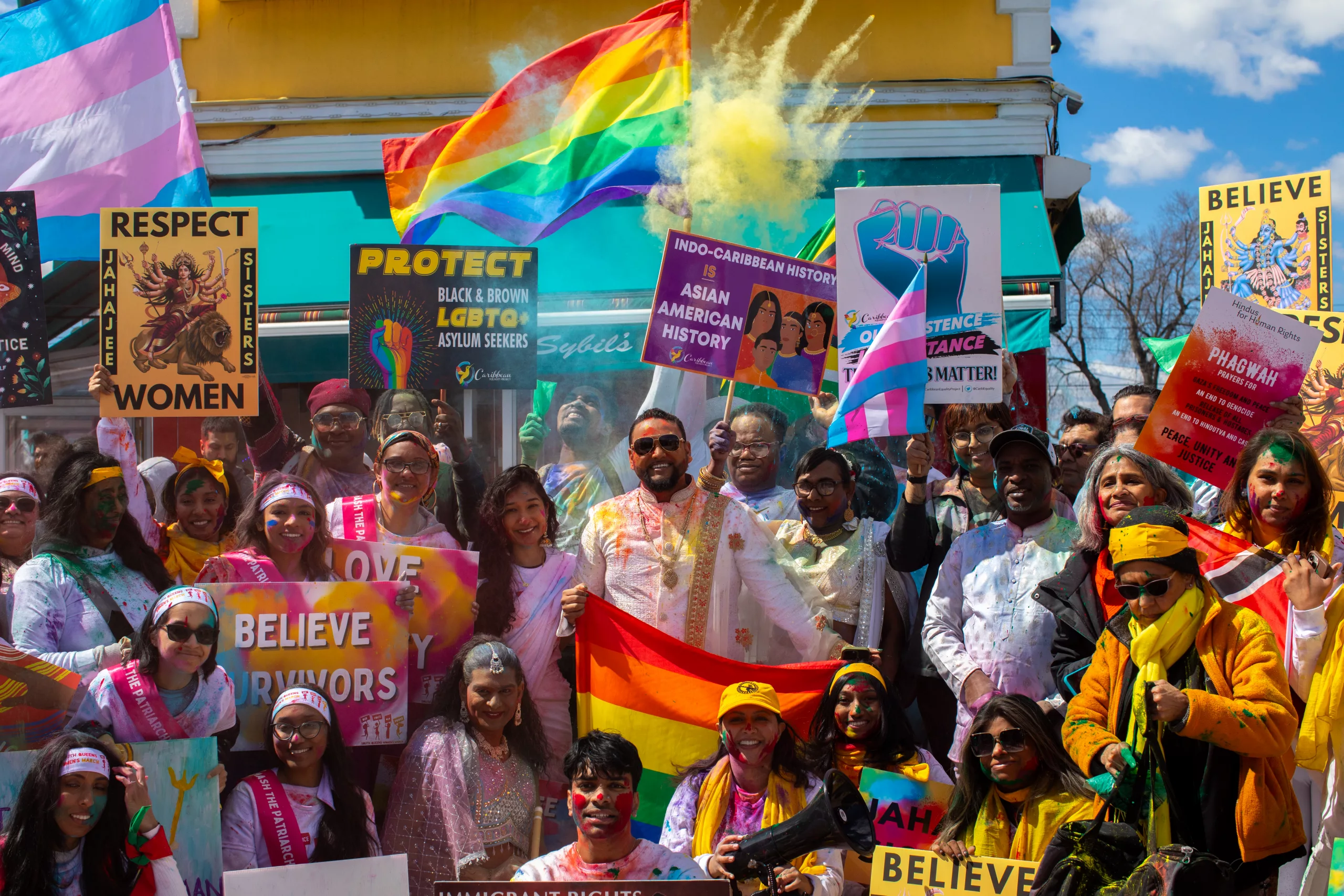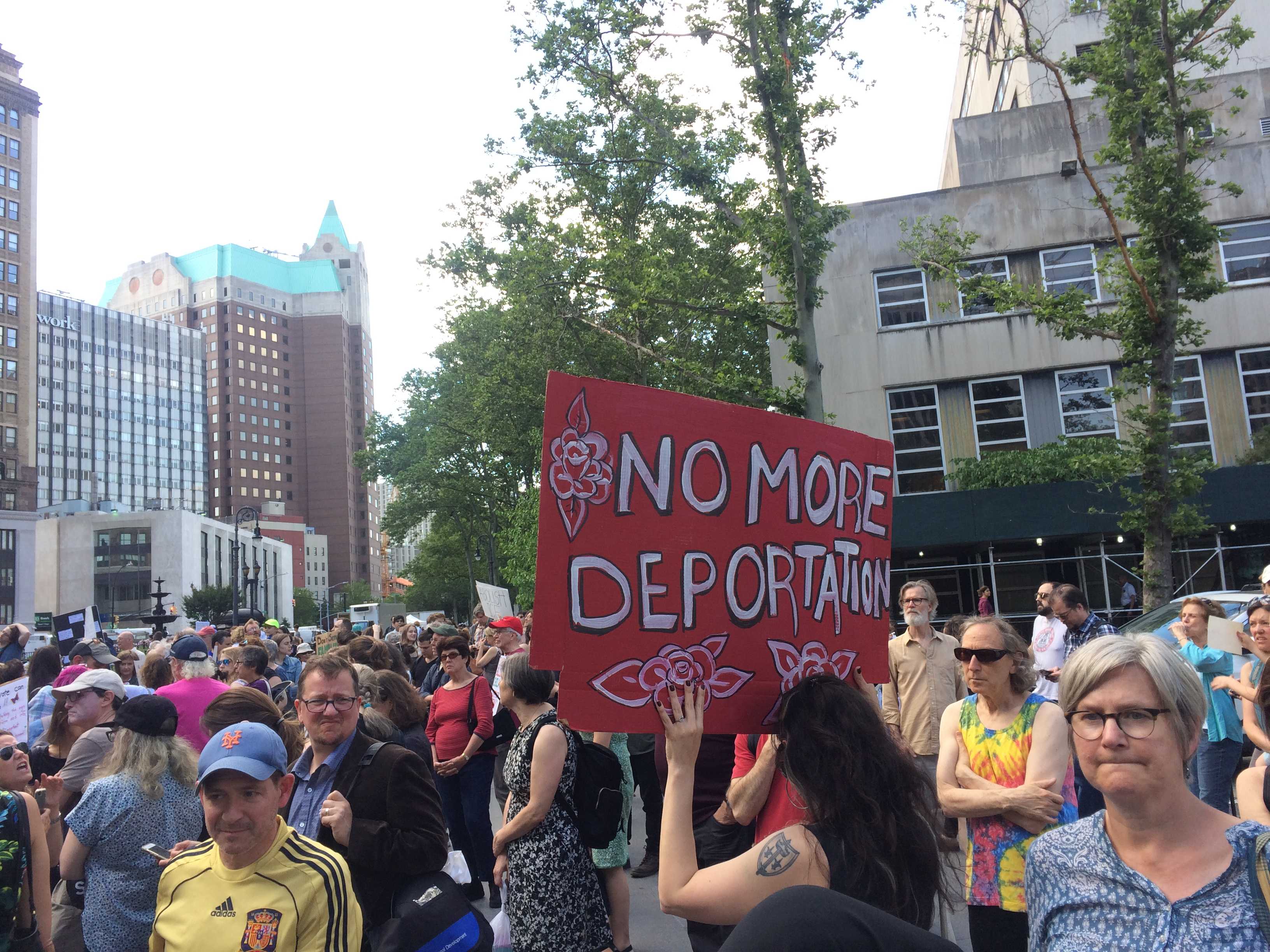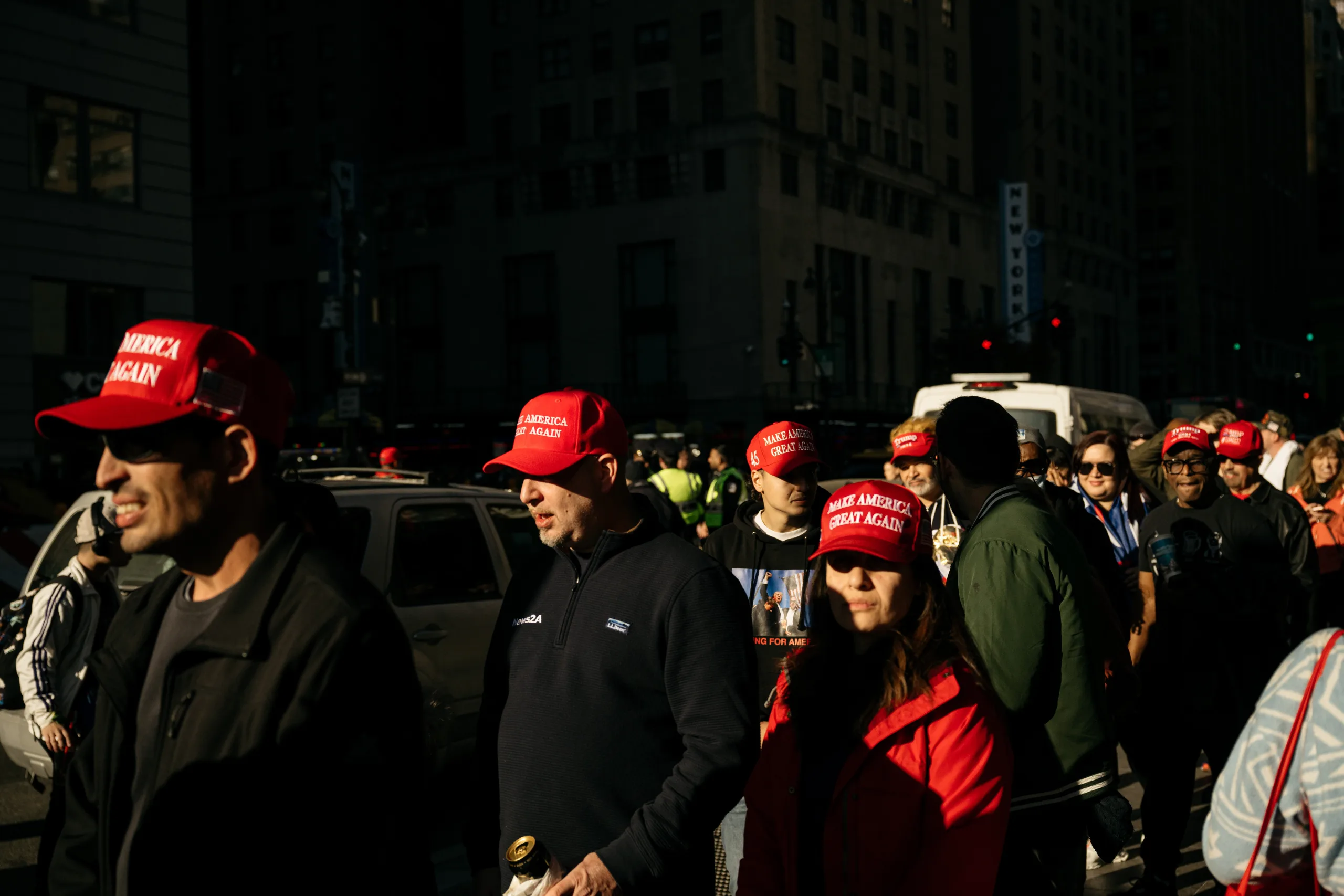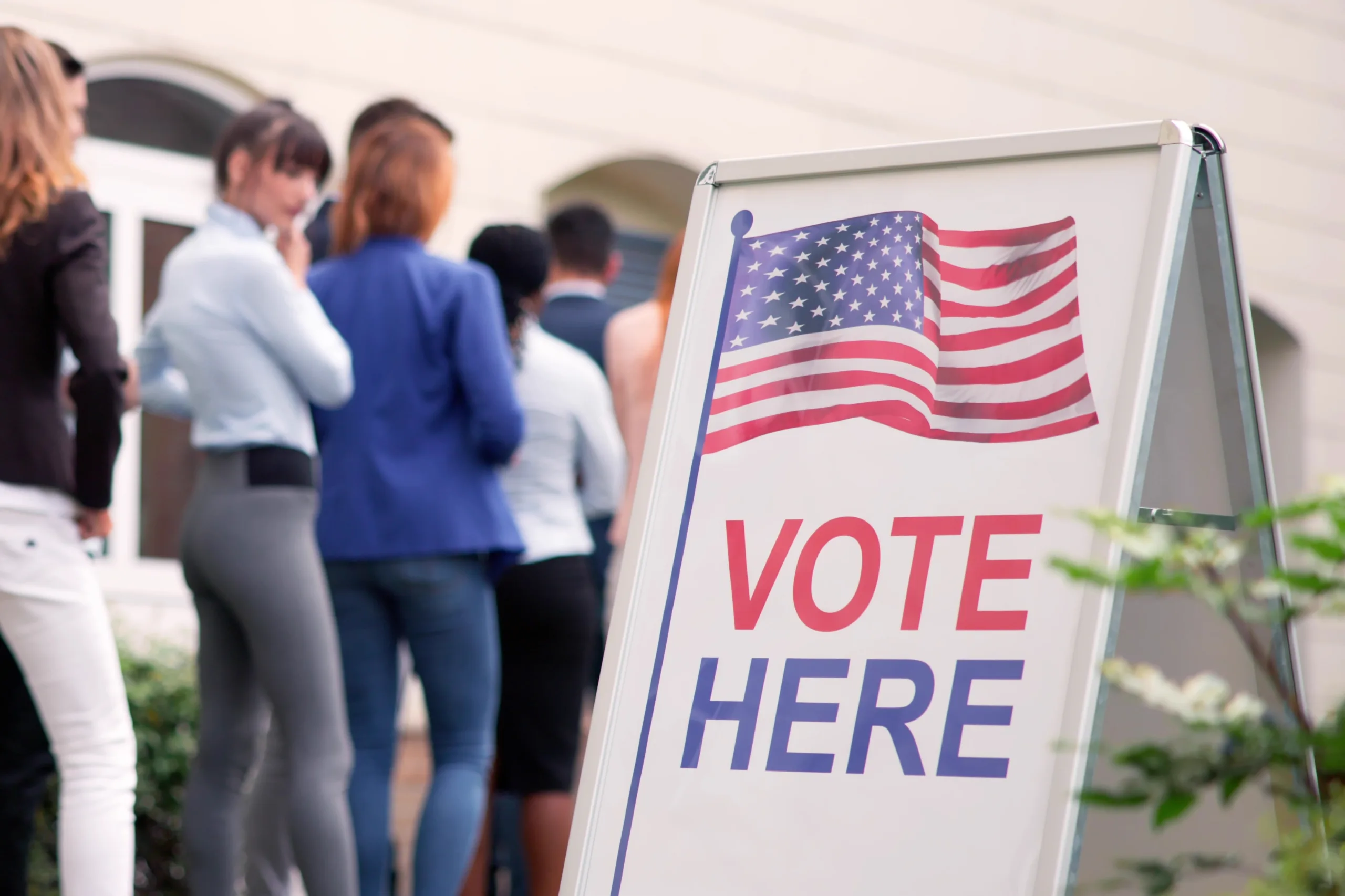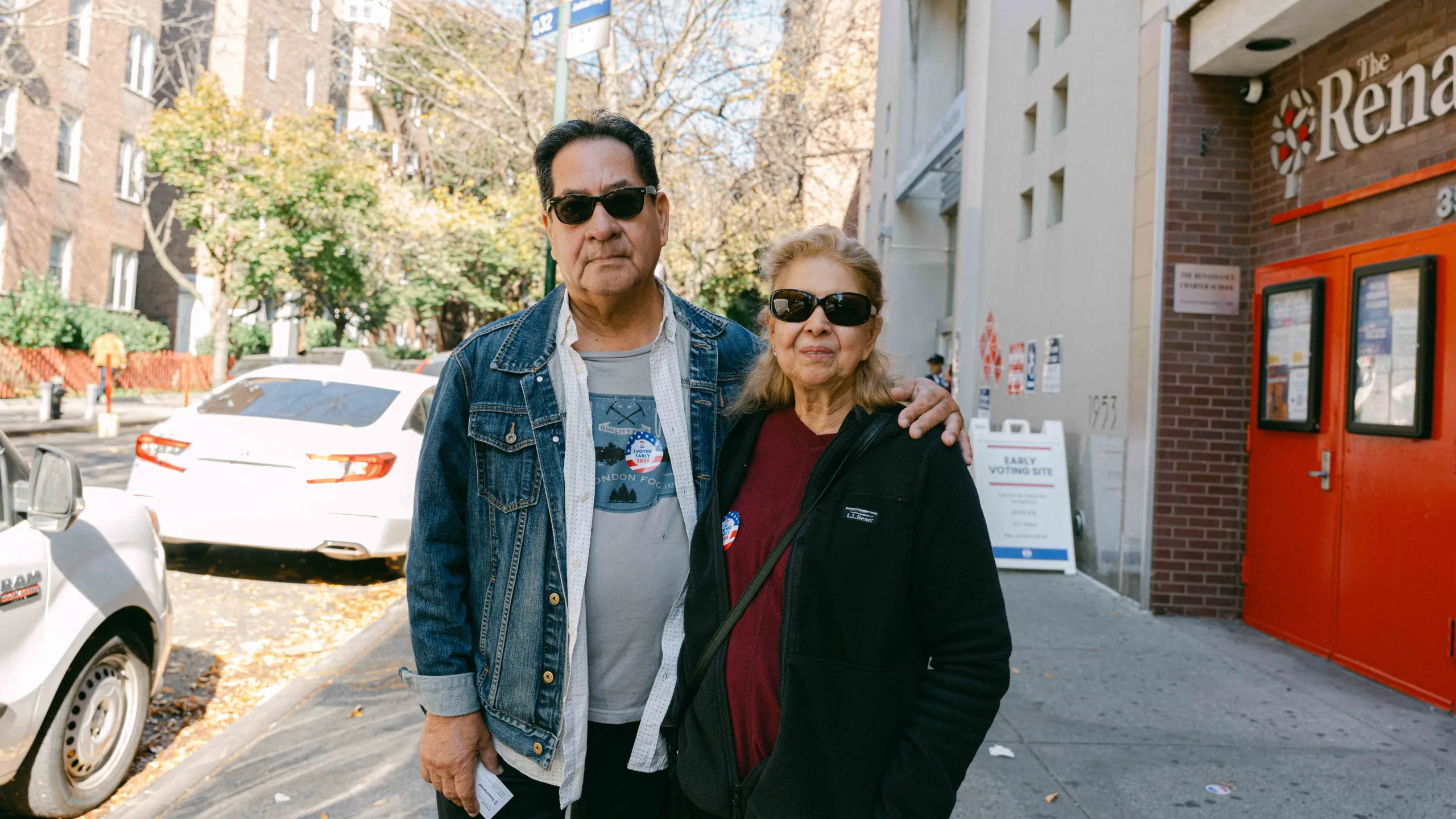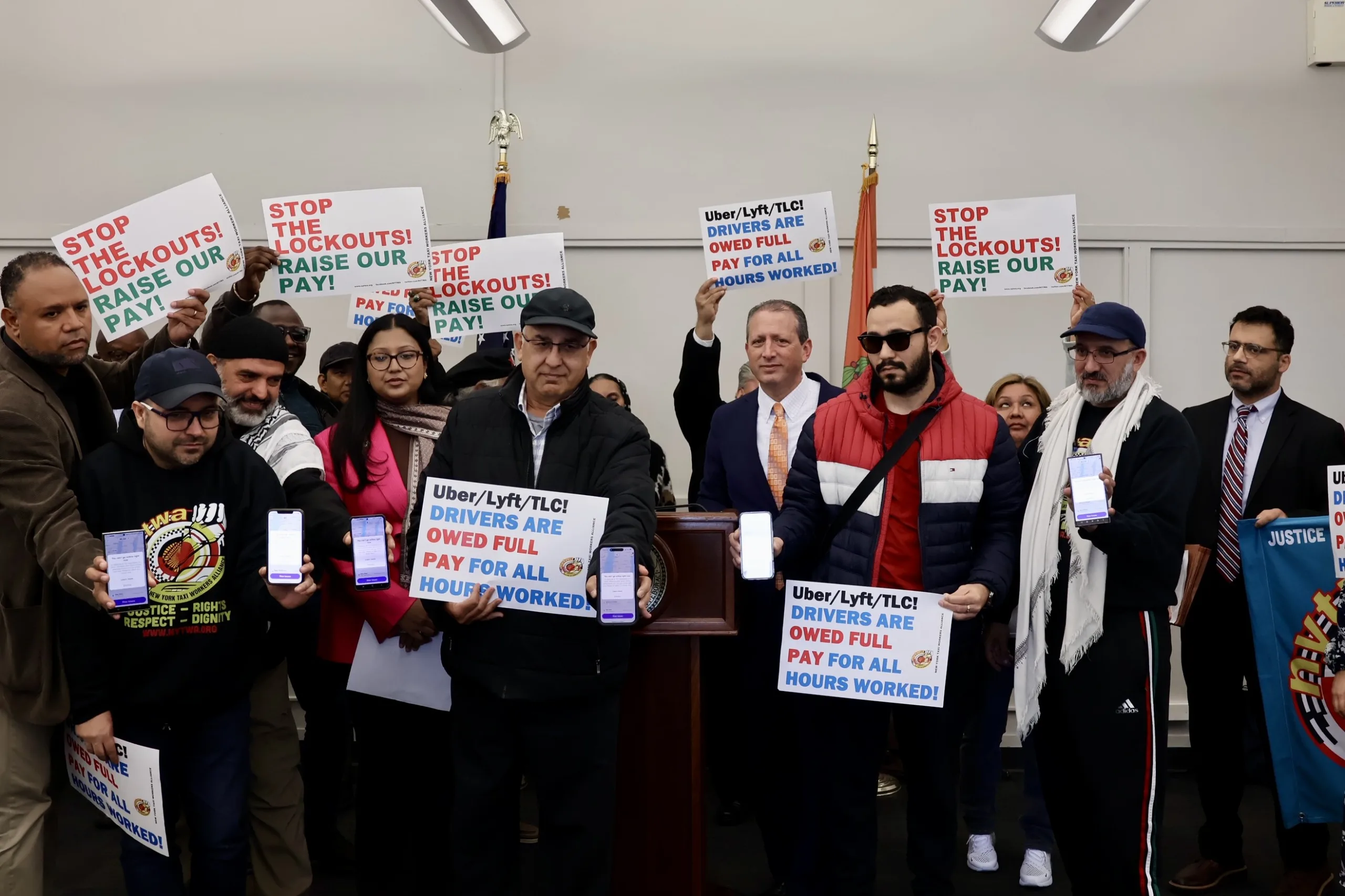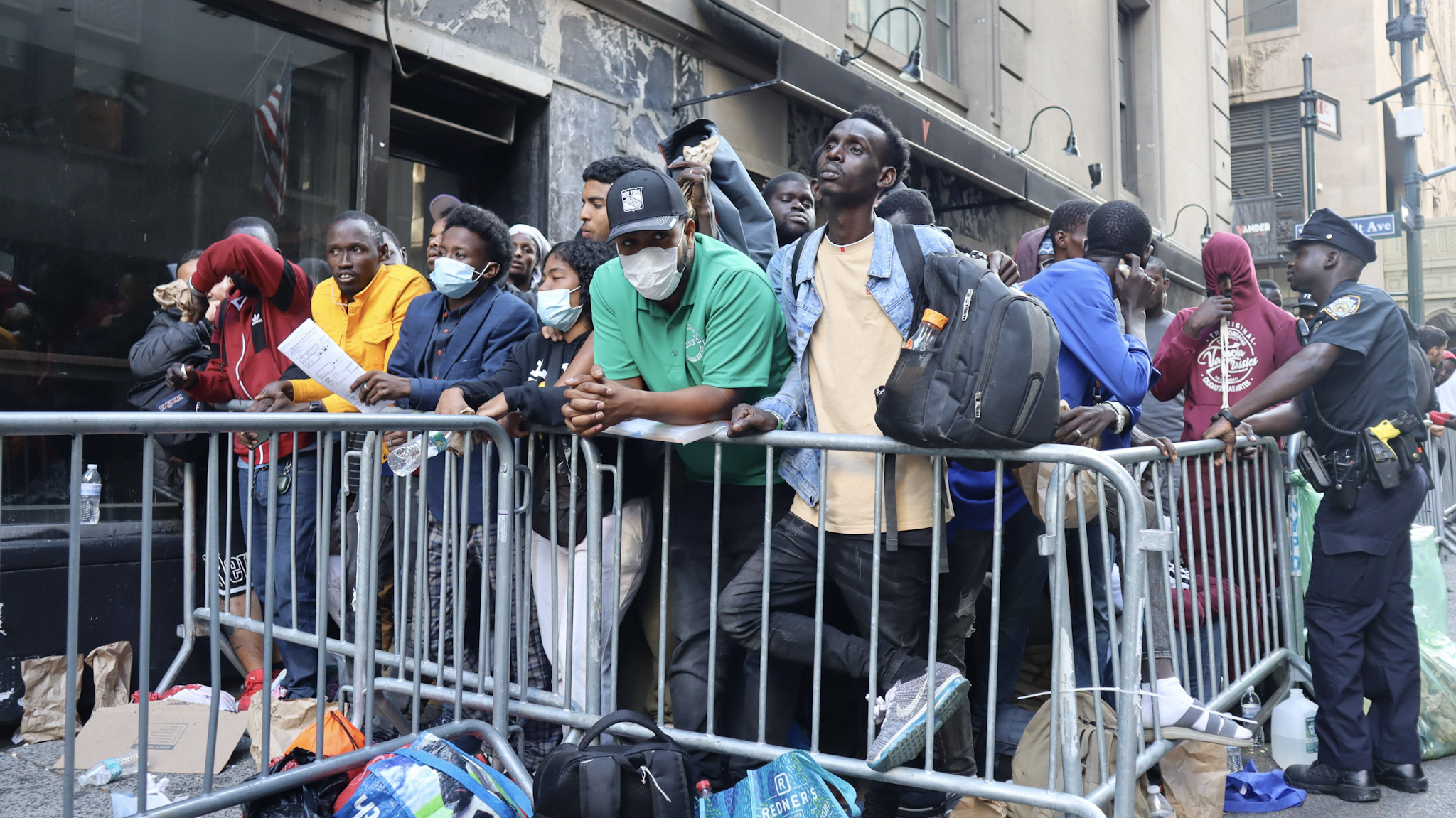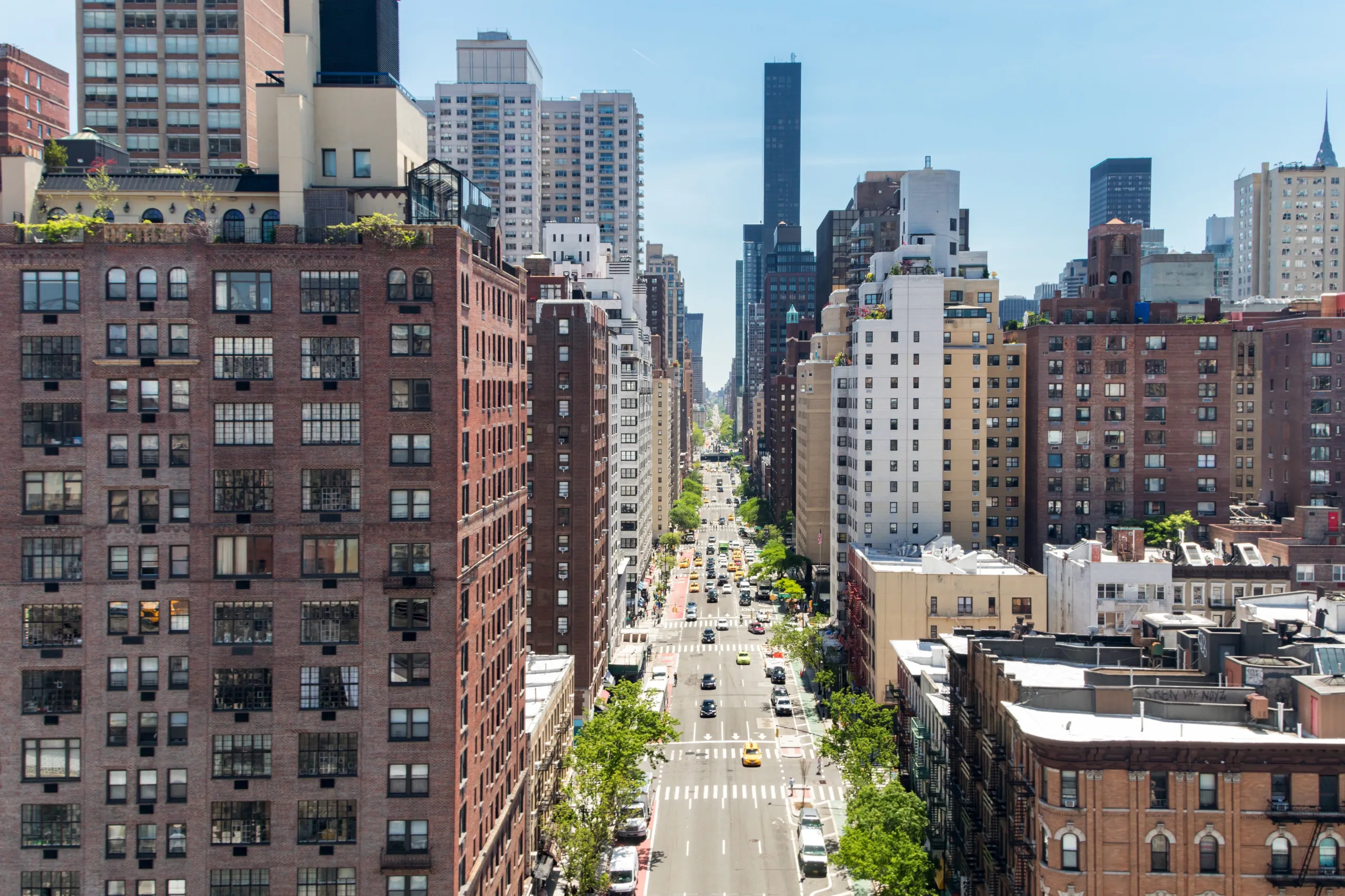At the end of a long day stocking shelves at a kosher grocery store, Olivia Valwaa stops in a Target to get ready for her next stop: the Brooklyn Community Pride Center. There, she’ll attend Unchained, the sole Caribbean LGBTQ+ support group in the States.
She changes into a comfy “Stay Humble, Hustle Hard” sweatsuit, adds a women’s silk flower bandana over a long black wig because it’s the touch of femininity she needs to feel like herself.
Makeup is next. She takes out each bottle in layering order: primer, foundation, concealer, liquid bronzer, liquid blush.
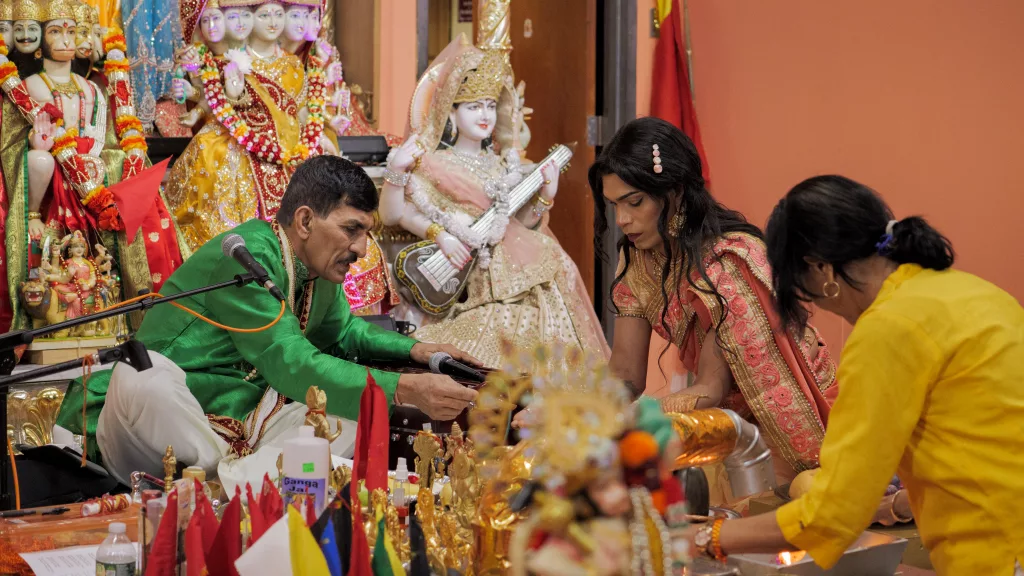
Unchained meets in an hour. It’s run by the Caribbean Equality Project, a community organization that advocates for, and represents, Afro and Indo-Caribbean LGBTQ+ immigrants in New York City. It’s the only organization in New York City and beyond that has addressed the needs of this population for nearly a decade.
While Valwaa and other asylum seekers navigate an immigration system stressed under shifting policies and the arrival of thousands of migrants, the organization provides a range of resources, from food and housing to political advocacy and peer support while they wait in a state of uncertainty.
A connection to Caribbean culture underscores everything, with the goal of giving what many have been denied in their home countries — safety, and visibility. “That is not only a safe space, but a brave space,” says founder Mohamed Q. Amin.
Some of the trans women Valwaa knows from the Caribbean Equality Project (or “the girls” as she calls them) frequently gather at Valwaa’s apartment for her makeup expertise. She instructs them on how to blend their eyeshadow and cover their beards.
Also Read: Fleeing Persecution in Guyana, LGBTQ Couple’s Life in New York is a “Dream Come True”
They can also look on her Tik Tok account, where she’s been documenting her trans journey since seeking asylum in the U.S. two years ago. The comments are mostly positive mixed with the occasional “dead dead man” that reminds Valwaa why she left Guyana, and why she can’t go back.
Tonight’s Unchained meeting focuses on mental health with a guest speaker, Shari Apollon who is the associate director of clinical services at NYC Affirmative Psychotherapy. Unchained has gathered for the past nine years, first in Richmond Hill then also in Crown Heights. The scant data that exist on LGBTQ+ migrant resettlement points to the mental health benefits of being with like-minded people, but this is something Amin knows on a cellular level.
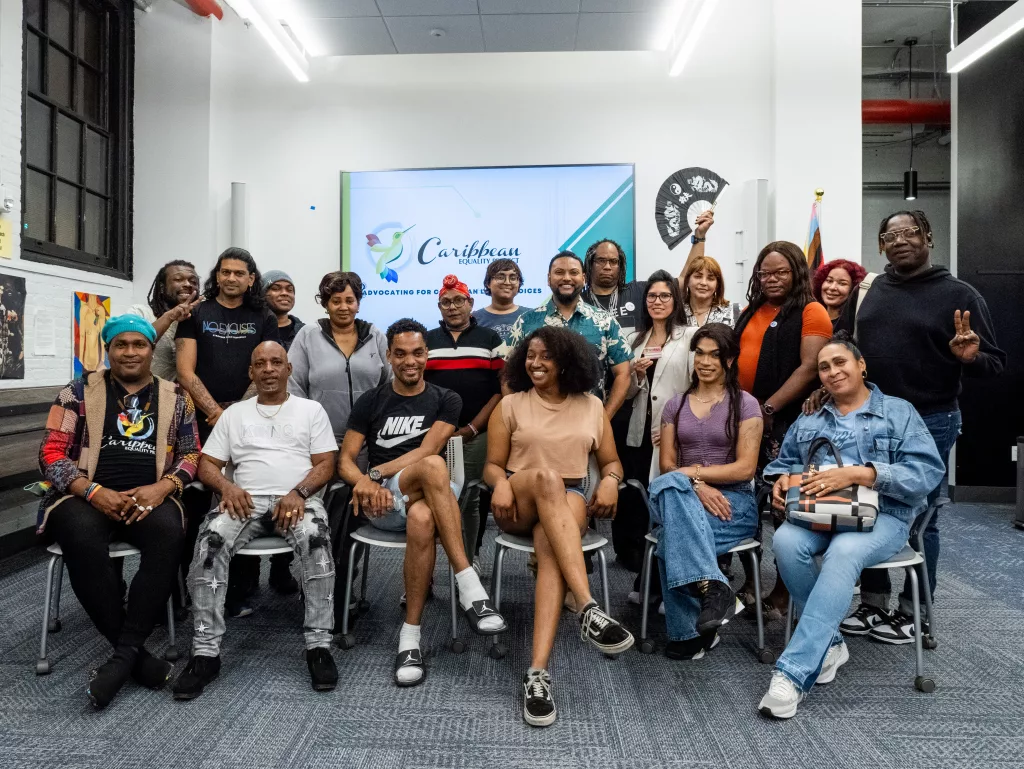
As a queer child of Guyanese Muslim parents who emigrated to New York when he was 11 years old, Amin understands survival means not only housing and food, but being in community. Yet oftentimes, he says, his peers won’t find that in Caribbean-centric neighborhoods where they can encounter the same discrimination from where they fled. He has also seen how they assimilate at other LGBTQ+ organizations where their queerness comes first, their Caribbean culture second.
Also Read: Free Healthcare and Support for Immigrants Living with HIV/AIDS in New York
He wants to give them a space where all their intersectional identities are celebrated. Last year, the Caribbean Equality Project supported over 350 asylum seekers by connecting them to immigration, food, housing and health services like HIV or gender-affirming care. For many, an Unchained meeting is their introduction to the organization, where they can get comfortable telling their story for the immigration process.
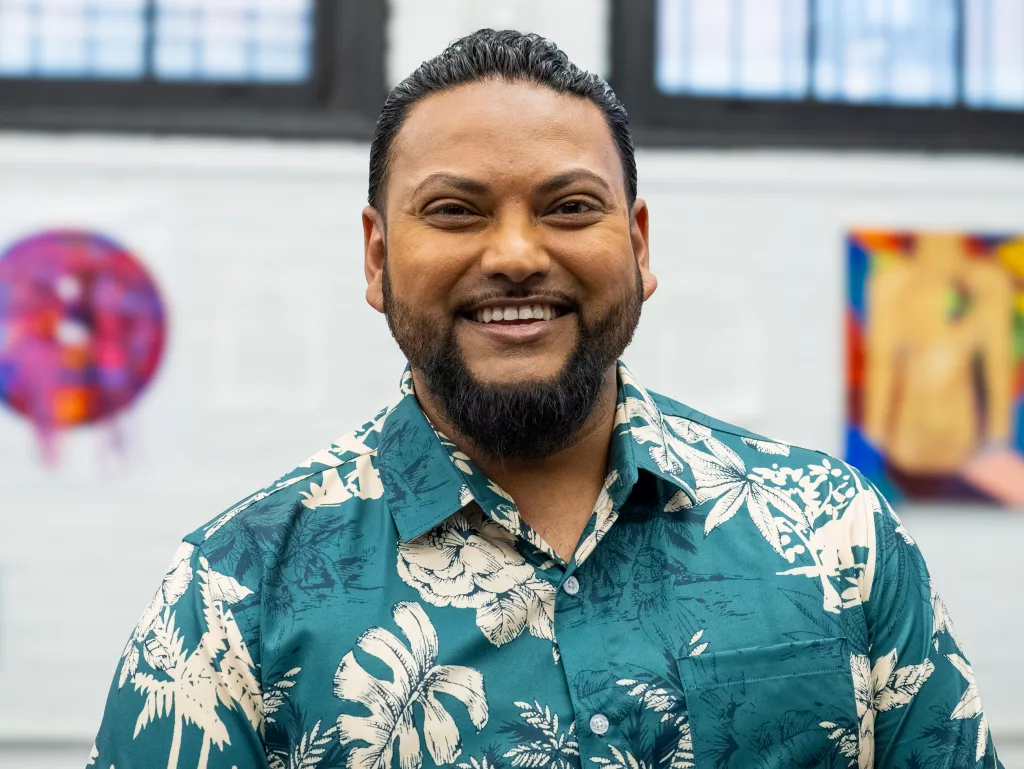
Now fully made-up and adorned in her feminine flair, Valwaa arrives at Unchained and is greeted by a barrage of “Hi honeys” and kisses on the cheek. People fill their plates with jerk chicken and peas and rice from Caribbean Cabana, one of the only caterers Amin has found that’s both Caribbean-owned and LGBTQ+-affirming. One person plays the up-tempo beats of soca music on a phone.
Valwaa takes a seat at the table, shoulders loose, and says she feels like the “baddest bitch” when she is with her people. People like Rarepearl Marcus, who twirls her coveted gold nameplate necklace. Or Alfred Atherley-Ward, who loves to sing Luther Vandross at karaoke.
Amin opens the group and asks people how they practice self-care. Answers include the gym, writing, Unchained. Some talk a lot, others say little. When it gets to Valwaa, she says her asylum process finally pushed her into therapy. “I really spiraled after having to revisit my past trauma in Guyana,” she says.
There are nods of agreement, empathetic looks on faces. They know what it’s like to shrink your life to 72 bullet points of the most traumatic events on an immigration form only to wait indefinitely for an interview where you must try to prove you have a ‘credible fear’ of persecution. The one shot that determines whether you stay or go.
Amitesh Parikh from Immigration Equality, a national organization based in New York City that had almost 700 pro bono cases for LGBTQ+ asylum seekers last year, says 35% of their clients are from the Caribbean — specifically Jamaica, Guyana, and Trinidad. There are challenges every step of the way, such as asylum officers and immigration judges misunderstanding queer issues or the logistical hurdles of an already “byzantine” system — including a 2018 law that deemed the most recently filed cases a priority.
“It really prevents people from living their lives,” Parikh says. The national affirmative asylum backlog has reached over one million cases, which means it could be years before Valwaa will know if she needs to trade the life she’s built here for one back home, which she says would be life-threatening as an out trans woman.
Also Read: Migrants Struggle to Find Lawyers to Meet One Year Deadline to File for Asylum
Valwaa grew up in East Coast Demerara in an Indo-Guyanese household. As a child, she’d apply red lipstick, slip on her mother’s blue flared skirt and spin like a ballerina. She’d feel euphoric but could only dance when her parents, who had an old school disapproving mentality, were out of the house.
On the streets, men would roll down car windows while Valwaa was waiting for the bus and scream “anti-man!” or women would suck their teeth when she’d browse bras at the shops. Every single day she’d hear a nasty comment that would cut like a machete right through her.
Though in recent years the police have had training around LGBTQ+ issues, they taunted people from her community at local police stations or worse, sometimes became violent.
During high school, Valwaa began to realize she was a transgender woman. She’d later learn about the centuries-old hijra tradition in India — which includes transgender people who are often invited to bless community celebrations — but nobody in her family ever mentioned that history.
Valwaa would go to the temple needing peace but instead encounter the same harassment. “When you die, what are you going to tell God?” some would say to her face. Valwaa eventually stopped going.
At barbeques in cane fields with a group of older queer and trans friends who could cuss out haters, she’d experiment occasionally — trading her baggy male clothes for brightly colored outfits made entirely of spandex. Mostly, though, she didn’t want to risk it.
Also Read: LGBT in NYC: Where to Get Healthcare, Name Change Services and More
Her gaze instead drifted to New York, where she’d see social media posts of the Pride parade, and “burst with color” inside. In America, she could get her GED, go to college, and become a nurse despite being queasy around broken bones and blood. In Richmond Hill, home to the largest diaspora of Guyanese people in the U.S., she could walk down Liberty Ave., go into any bakery and eat a piece of salara coconut roll, its magenta swirl giving her sweet memories of home.
‘Yes, I’m Olivia.’
On a walk down Liberty Ave. one day in the fall, Amin stops at the Guyanese-owned bakery Sybil’s that’s faced the “Welcome to Richmond Hill” sign for over 40 years. Cookie, the current owner, hands him a bag of pine tarts on the house. “Exquisite,” Amin says.
This is Little Guyana. Cooks clap roti in restaurants. Women linger in saree stores that blast chutney music. Men cut fresh coconuts in front of Dunkin Donuts. Colors everywhere. Produce bins filled with purple balanjay. Blue barrels used to send goods overseas. Red, green, gold of the Guyana flag.
“Anything and everything that is Caribbean thrives in Richmond Hill,” Amin says. “And that includes homophobia.”
Amin heads towards 129th street. He points to Impulse Bar, where the Caribbean Equality Project has hosted LGBTQ+ sensitivity trainings. Next door is a pink two-story building with metal grates. Amin pauses. “I don’t pass it a lot, actually. I avoid it,” he says about the place, which used to be a bar named Players. “I still remember my brother’s blood on the floor.”
Eleven years ago at Players, a tassa drum player physically assaulted Amin’s brother Zaman, a drag performer who is also openly queer. It was the catalyst for Amin to start the Caribbean Equality Project. The same day the Supreme Court announced its affirmative decision on marriage equality in 2015, Amin announced its launch.
Also Read: A Marriage Story: NYC Nonprofit Plans Weddings For Asylum Seekers
Amin kept the organization in the neighborhood. He’s the only full-time employee on the team — organizing food drives, arranging buses to Albany for members to meet with legislators, writing letters of support for asylum seekers, struggling to find funding at times. Players has closed and the Caribbean Equality Project is open although it doesn’t have a physical space of its own. Amin also hasn’t been back to Guyana, afraid to walk down the street as himself.
Valwaa got connected to the Caribbean Equality Project through a friend. Five years ago, she got a tourist visa and would travel between Guyana and New York. Every trip emboldened her to embrace her trans identity, and it was a mentor in New York, who she calls her trans mother, who first told her to apply for asylum after a sexual assault one night at a bar in Guyana.
Like many others in her community, Valwaa didn’t know she could — or even where — to find legal support until her friend introduced her to Amin.
Amin helped her find a lawyer to take her case pro bono. Eventually, under PRUCOL status that gives public benefits to asylum seekers and others who apply for permanent residence, she became eligible for a housing voucher. Now, she lives in a one-room apartment that’s walking distance to the Shri Lakshmi Narayan Mandir on Liberty Ave., where she volunteers most weekends.
One Sunday in the spring, Valwaa is at the Hindu temple with her friend April Darshan, another asylum seeker and member of the Caribbean Equality Project who is now like family. At last year’s Pride, Darshan was the one who’d follow behind Valwaa, adjusting the broken straps on her rhinestone and feather outfit.
Darshan and the rest of the girls have shown Valwaa why she must go to the parades, rallies, community actions. Amin has been encouraging her, too. Like inviting her to speak when they helped campaign to make Diwali a school holiday in New York City, eventually winning. Or at this month’s Pride flag raising ceremony in Richmond Hill that unexpectedly had police presence, mirroring the fear Valwaa felt in Guyana.
Also Read: LGBTQ+ Asylum Seekers Allege Discrimination in Shelters
Other times, as a community advocate, Valwaa assists Tiffany Jade Munroe, the organization’s trans justice unit coordinator who successfully fought to pass the Trans Safe Haven Law in New York City to protect trans youth. “I’m proud when activists see me and they be like, ‘Oh, you’re from the Caribbean Equality Project,” Valwaa says. “ I’m like, ‘Yes, I’m Olivia.’ “
Sometimes she says no to Amin because her schedule with work and a medical assistant course is too much. Sometimes it’s hard to get up at 4 a.m. and take the bus to Albany. Sometimes she’s not sure if she can speak her story into the microphone.
What she’s sure of: Being part of the Caribbean Equality Project has allowed her to walk down the streets of Liberty Ave, head held high.
At the temple in Queens, the bhajan singing is calming. So is having Darshan there. They love to get dolled up together and Valwaa is wearing a flowing white sari, pearl necklace and bindi, and silver arm bangles she bought at a shop down the street.
“I always wanted to be myself at temple,” she says. “Now that I have the opportunity, I’m going to slay.”
She bows her head, closes her eyes. Everything disappears; it is only her and Mother Durga. After about an hour of puja (worship), Valwaa reaches into her pink Guess purse and hands Darshan her phone.
“Take a video of me,” she says.
The video is for the girls when they can’t go to temple and for herself, a way to document every small joy. Proof that she is here, in Queens, with her people.
She’s ready to carry the flowers up to Mother Durga, goddess of femininity and power. She walks down the aisle, hands slightly shaking, with the feeling that someone will say something but nobody does. They never do. A woman in a green sari smiles and waves. Valawaa places the flowers at the statue’s feet, thanking her for her blessing.
